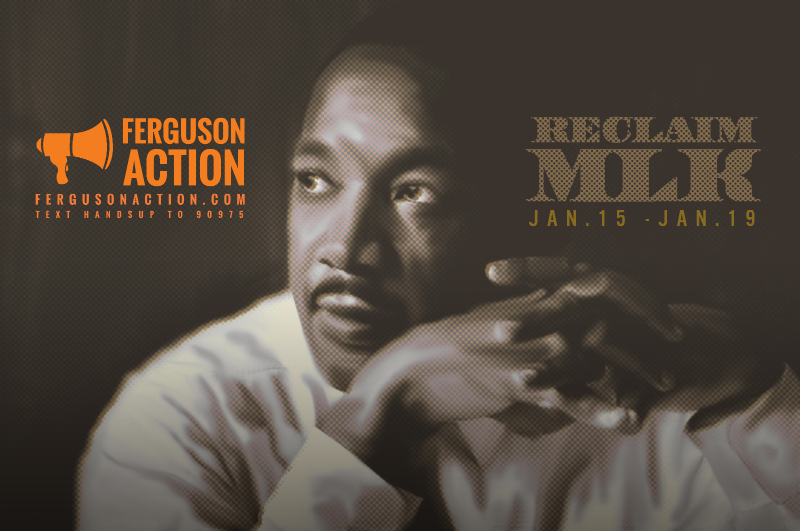MLK Day This Year Is Going to Be Interesting
By:
On Monday, protestors across the country will be celebrating Martin Luther King, Jr. Day with marches and other direct actions in solidarity with the Black Lives Matter movement. Instead of taking a three-day vacation, these activists have chosen to “Reclaim MLK” and his legacy.

Ferguson Action, a group out of Missouri that issued a list of national demands against police violence and other forms of discrimination, posted on their website,
“Martin Luther King Jr’s life’s work was the elevation, honoring, and defense of Black Lives… From here on, MLK weekend will be known as a time of national resistance to injustice. This MLK weekend we will walk in the legacy of Dr. King and the movement that raised him.”
Many Black Lives Matter actions have been disruptive and controversial—and the actions this weekend have been no different. Last Thursday, activists in solidarity with the Black Lives Matter movement in Boston shut down Interstate 93 for four and a half hours, provoking resentment by commuters.
Yet the organizers were unapologetic about the disruptive nature of their protest. Their statement, printed in the Boston Globe, noted,
“Boston is a city that stops, on average, 152 Black and brown people a day on their ways to work, to their homes, to school and to their families. Is that not “disruptive”?... A delay in traffic or on the MBTA is not comparable to the constant state of fear and anxiety created by police in Black and brown communities.”
Other actions have targeted city and federal government buildings. On Friday, a group of activists in Oakland blocked most entrances to a federal building for four and a half hours.
Although no federal buildings will be open on Monday—it’s a federal holiday—Americans can expect similar actions across the country on January 19. Organizers in 30 cities have announced a 4 Mile March, coordinated by the national Coalition Against Police Violence. Details and Facebook events listing marches across America on the group’s website here.
We can also expect Black Lives Matter organizers and their allies to use creative direct actions to get out their message. In the past few months, protestors have made use of performance art, staging die-ins in public spaces and projecting videos on public buildings to send a powerful message about police violence against people of color. They have used symbolic references to black Americans killed by police: four and a half hours, the amount of time that Mike Brown’s body lay in the street after he was shot by police in Ferguson, MO; eleven, the number of times Eric Garner repeated “I can’t breathe” while police strangled him to death.
And they have chosen to protest in sometimes unexpected places. Two weeks ago, black protestors interrupted elite brunch destinations frequently mostly by white middle-class patrons in Oakland and New York City. #blackbrunch sent the message that even a seemingly innocuous Sunday morning tradition is racially charged.
Although the Black Lives Matter movement doesn’t have one visionary leader like Martin Luther King, Jr., it has what some might consider an even more powerful structure. Founded by three queer black women, Black Lives Matter actions have been led by young people, queer and trans people, and women.
We can’t expect #ReclaimMLK to look exactly like the 1963 March on Washington for Jobs and Freedom—but Monday will be a powerful day of action across the country. If you’re not joining a march yourself, you can follow the weekend of protests on social media with #blacklivesmatter and #reclaimmlk.
